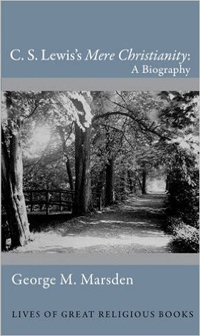 George Marsden, C. S. Lewis’s "Mere Christianity": A Biography (Princeton, NJ: Princeton University Press, 2016), 280pp.
George Marsden, C. S. Lewis’s "Mere Christianity": A Biography (Princeton, NJ: Princeton University Press, 2016), 280pp.
A guest review by Brad Keister.
This book forms part of a series from Princeton University Press entitled “Lives of Great Religious Books,” ranging from the I Ching to Augustine’s Confessions. George Marsden (author of A Short Life of Jonathan Edwards and The Soul of the American University, among others) chronicles the background behind this well-known book by C. S. Lewis, its rise in popularity, and endeavors to understand its endurance.
Mere Christianity has its roots in a series of radio addresses that Lewis agreed to give at the behest of the BBC beginning in 1941, when Great Britain was fighting for its life alone against the German air war. His approach deliberately avoided an academic gloss that one might normally expect from an Oxford don, and also steered clear of sectarian questions. His intended audience was the typical radio listener (with radio being a somewhat new medium at that time), and his purpose to communicate what he saw as the weighty issues of life (often drawn into sharp focus in those years of German bombardment) in a vernacular language that would connect to his audience. The first set of broadcasts led to a second and third, and were popular with listeners to the point where Lewis compiled them into a book.
Reception of this book was mixed from the very beginning. Critics on the liberal side regarded it as an attempt (accompanied by poor scholarship) to return to an unenlightened era of the past. Conservatives often saw themselves aligned with portions of Lewis’s reasoning, but were determined to ‘fix’ portions that each considered to be outside proper orthodoxy. Yet among all varieties of critics there were those who considered the book to be refreshing — the right voice at the right time. And readership soared into the 1950s and 1960s, more so in the United States than Britain, and now across the world. In each decade since publication, many critics have predicted that Mere Christianity would soon fade into oblivion. Many also agree that there are pieces of the book that could stand revision, and Lewis himself made alterations between editions. Yet its foundational message endures in the unrecorded lives of many, as well as in publicly known figures such as Francis Collins (former head of the Human Genome Project and now Director of the National Institutes of Health), the novelist Walker Percy, and Bono of U2.
In the closing chapter, Marsden sets forth seven elements of what he sees as the “lasting vitality” of the book. Just one example (#2): “He uses common human nature as the point of contact with his audiences.” Only time will tell — a few decades is a small fraction of the age of many of the other books in the Princeton University Press series. And Mere Christianity faces an inherent dilemma of longevity, as Lewis intended to communicate what he saw as timeless questions and their possible answers in a language that was comfortable in its day.


